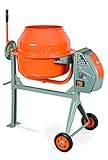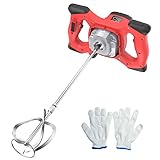Concrete is an irreplaceable construction material used in a wide selection of building projects including residential buildings and commercial complexes. It is highly important to have structures which are durable and robust, and this can be achieved through adhering to the parameters of concrete mix.
The proper mixing of the ingredients is essential to guarantee the superior concrete quality. Hiring a concrete mixer is an excellent alternative. Choosing an onsite portable concrete mixer will unlock a plenitude of advantages for you. These portable truck mounted concrete mixers offer a great option where flexibility, mobility, and control of your concrete need is desired.
The highest rated portable concrete mixer is Yardmax YM0115 4. 0 Cu. Ft. Portable Concrete Mixer. The unified mixer came pre-assembled for simple and mess-free installation, while the steel handle utilized a safety lock and an iron ring for quick adjustments and locking it in place securely and efficiently.
On our list of the best options is the IMAYCC 2100W Electric Concrete Mixer and Cement Mixer. Concrete mixer is great for different construction and DIY projects. It has six-speed settings to control the stirring speed. It, being handheld, on the other hand, leads to user fatigue.
Another third-best portable concrete mixer is the Anbul Portable Cement Mixer, 2100W. The machine is fitted with a 6-speed setting to adjust the mixing speed. It has a handgrip design like a car steering wheel handle that minimizes the vibrations therefore it is easy to handle. However, being of handheld, it causes user fatigue.
What is a Concrete Mixer?
Concrete mixer, commonly referred to as cement mixer, is a machine used in construction projects. It normally mixes cement, sand, gravel and water to form concrete. In addition, the machine has a mixing mortar and a drum that rotates where the raw materials are placed, and the mixing is done by the rotation of the drum. The rotation of the mixer ensures that the ingredients are well mixed and the concrete mixture is uniform in consistency.

Image Source: easytoolhire.com
Mobile concrete mixers are also employed for the preparation of smaller volume works on the construction site providing the workers with enough time to use it before it becomes unworkable.
It is now time to check out what a concrete mixer is so that we can then see the best portable concrete mixers which can be used for on-site mixing.
5 Best Portable Concrete Mixers
Rank | Product Image | Brand Name | Link |
|---|---|---|---|
1 | |||
2 | |||
3 | |||
4 | |||
5 |
1. YARDMAX YM0115 4.0 Cu. Ft. Portable Concrete Mixer
- Cleans easy with solid steel drums, and IP45 wash down certified...
- Motor drive box is factory-assembled for easy and mess-free...
- Quick 1-person assembly can be done in under thirty minutes
- Steel handle uses an iron ring and safety lock for easy...
- Low-profile height makes it simple to pour into forms,...
The Yardmax YMO115 Portable Concrete Mixer is made of a strong steel frame and tough materials, so it can withstand the toughest jobs. Opening the box the first thing that caught my eye was the motor drive which was already assembled ready for an easy mess free install. It took me 30 minutes to assemble, and I was set to give it a try.

Image Source: youtube.com
The 4. 0 cubic-foot drum capacity is suitable for mixing concrete, masonry, and compost for most smaller to medium-sized jobs. Moreover, the rapidity and simplicity with which it blended the cement and cut down my efforts caused me to be in awe.
These safety features should be highlighted as well. The steel handle is equipped with a safety latch and an iron ring which makes for easy adjustments and locking in place securely and with ease. The mixer is also fitted with a sturdy steel splash guard which protects the workplace from splatter during operation, ensuring that the workplace remains clean and hazard-free.
There is some noise, but it is extremely quiet compared to other kinds of power tools that I have used, and working with it is much more enjoyable even for longer projects. Surprisingly, I find the mixer easy to clean after use. Besides, the compact design and strong wheels support steering through job site places easily.
Pros:
Cons:
2. IMAYCC 2100W Electric Concrete Mixer
- 【Powerful Motor】This Cement mixer equiped 2100 Watt motor...
- 【Adjustable 6 Speed】This Concrete mixer design a 6 speeds...
- 【Overheating Protection】This Mud mixer carry with Porous heat...
- 【Easy Operation and maintenance】Dual ergonomic handle and...
- 【What you get】Concrete Mixer Kit x1 ; Spare Carbon Brush...
The Electric Concrete Mixer of IMAYCC has a 2100-watt motor with wide range of speed starting from 270 to 900 RPM to handle multiple tasks. With this mixer, you will have a breeze in mixing a variety of materials like mixing of cement, oil paints, and fodder to more demanding materials like plaster, thin-set mortar, and cementic adhesives.

Image Source: amazon.sg
The concrete mixer has a 6-speed adjustable gear mechanism, screw-shaped dual paddles and a self-locking switch, resulting in efficient and uniform mixing. No longer a day should go by where you spend more time manually stirring and risk splashing around.
The mixer contains an overheating protection system, which uses a porous thermal dissipation design. They provide me with long-term usage and stress-free situation as I work on complex projects. Furthermore, this machine is also easy to operate due to the dual ergonomic handles and the operation locking switch.
The ergonomic design of the mixer eases finger fatigue during extended mixing periods hence enabling me to concentrate on other things. In the upkeep the all-copper carbon brush holder comes handy as it offers fast and convenient servicing. Additionally, the installation was simple; I set everything up in just a few minutes.
Pros:
Cons:
3. ANBULL Portable Cement Mixer, 2100W Handheld Electric Concrete Mixer
- ⊱Powerful motor⊰ 2100W electric handheld concrete mixer,...
- ⊱Adjustable speed⊰ High and low gears features 6 speeds with...
- ⊱Reliable quality⊰ The cement mixer with alloy hardened...
- ⊱Special design⊰ Car steering wheel type handle can better...
- ⊱Applicable materials⊰ This is an industrial grade handheld...
The Anbul Portable Cement Mixer features a 2100W high-power motor to mix your mortar quickly and evenly. This is where both money and time are saved. I discovered that it could work with anything from cement, concrete, grout, paint to the stuffing of meat thanks to its 110V/60HZ power source.

Image Source: youtube.com
The mixer has speed control of six different speeds and a self-locking switch. The humanized adjustment makes it a perfect choice for different materials, whether the mud, concrete, cement or plaster. Moreover, the 0-800 min thick galvanized rotating stirring rod makes it durable and capable to withstand heavy mixing tasks.
Also, the steering wheel type handle with reduced vibrations lets you use the control without getting tired very fast. Moreover, incorporating with a locker mechanism for sustained operation is an innovative feature that comes in handy when you know you will be hands-free, thus enhancing work site productivity and efficiency.
Pros:
Cons:
4. BILT HARD Cement Mixer, 4.5 Cu. Ft. Electric Concrete Mixer Machine
- Powerful Motor - The cement mixer is equipped with a 550W 120V 5A...
- Drum Capacity - Features a 4.5 cu ft. (roughly 127L) max...
- Durable and Sturdy - The Wheelbarrow Mixer is constructed with a...
- Maneuverability - The steel handle uses an iron ring and safety...
- Simple Operation - Comes with all hardware parts and a...
The Bilt Hard Cement Mixer - it is equipped with a 550W 120V 5A motor that can run up to 2850 RPMs and is suitable for handling concrete, mortar, or stucco. At 26. 6 RPMS, which is ideal for commercial and agricultural purposes. It has a 4. 5 cu ft. maximum capacity which will make mixing very quick and effective. Furthermore, the 15-inch drum diameter gives you enough place, and adding dry mix is also possible.

Image Source: fatllama.com
The concrete mixer consists of a metal cast and steel components, whereas the frame and the drum have a powder-coat finish for making it stronger and more durable. The triangular bracket is to provide added support. In contrast, I found the mixer straightforward to configure because it had all the hardware components and a clear manual. It literally took few minutes to assemble, and now I was ready to put it to the test.
In addition to that, the steel handle provides the safety lock and iron ring that make adjustments and placing safely much easier. The characteristics of being portable, stable, load-bearing, and shockproof permit me to move around the job site and ensure that I am not straining myself. Secondly, the compact design makes my small DIY projects comfortable as I can transport it from one area to another without difficulties.
Pros:
Cons:
5. Generic (Gen120) Portable 4.2 Cubic Feet Concrete Cement Mixer
- POWER MOTOR: This 110-120V cement mixer has a powerful motor....
- EASY TO OPERATE: The electric mixer has a capacity of 4.2 Cu.Ft....
- HIGHT QUALITY & PORTABLE: The electric concrete mixer is made of...
- MULTIPLE USAGES: This cement mixer is ideal for industrial...
- EXCELLENT SERVICE: Comes with all required hardware and...
The Gen Gen120 Portable Cement Mixer is constructed from strong and corrosion resistant alloy steel making it suitable to withstand construction site's harsh conditions. It has a capacity 4 of. 6 Litres, it meets the demands of making enough for a large batch, and at the same time, allows for convenient pouring.

Image Source: indiamart.com
The wheeled stand which is triangular in shape is an ingenious addition that makes the mixer more portable. The wheels make shifting the machine to another location effortless, and the strong structure makes sure that it stays in place while it is operating. Also, the non-slip handle comes with a firm lock which helps in holding the drum firmly and securing it in place during operation.
Thanks to its easily manageable design, operating the concrete mixer is a piece of cake. As good as it is in industrial concrete, mortar, and stucco, I also discovered that it was excellent with mixed feed. This multifunctionality allows me to save my time and money because I no longer need to buy separate devices for different tasks.
The mixer is equipped with all the necessary installation manuals and attachments to facilitate stress-free setting up process. My only problem with this equipment is that it is more noisy than I expected while working.
Pros:
Cons:
Factors to Consider When Choosing a Portable Concrete Mixer
Here are the things to keep in mind when picking a portable concrete mixer for site mixing.
1. Capacity And Output
Address the needs of a portable concrete mixer by taking into account its capacity and output. The mixing capacity of a cement mixer depends on how large a volume of cement it can hold and mix at a time. Suitable capacity selection means a fast and effective production process without any unnecessary delays. Lower-capacity cement mixers are appropriate for smaller projects. On the other hand, the bigger size could require cement mixers with higher capacities.

Image Source: chinaconcretemixers.com
For instance, a mobile concrete mixer of two to three cubic feet capacity is workable if you're dealing with a residential driveway. On a contrary note, a cement mixer with the capacity of 6 to 8 cubic feet would be more proper to construct a commercial building foundation.
2. Power Source Options
Electric concrete mixer
An electric concrete mixer is usually there when electricity is available. These are supposed to be noiseless, do not produce any carbon emissions and need less maintenance as compared to their counterparts. But, it can be limited in the mobility and the power may be needed nearby or generator for remote locations.
Gasoline concrete mixer
A gasoline concrete mixer is different from an electric cement mixer because the former does not rely on electricity for mobility. Gasoline mixers are typically less expensive and weigh less, which makes them easy to carry around.
Diesel concrete mixer
Similar to gasoline mixers, diesel cement mixers are ideal for sites that have no electrical outlets. Their fuel consumption is lower and they are perfect for heavy-duty applications.
For a small residential project that is plugged into electricity, an electric cement mixer would be a wise and low-cost choice. However, if you engage in big-scale construction projects in rural areas diesel-powered cement mixers would be the best choice. They offer the necessary power and mobility.
3. Mobility And Maneuverability
Mobility and maneuverability matter when comparing portable concrete mixers for off-site mixing. At construction sites, the cement mixer is usually transported to other locations. The wheels, handles and tow bars allows for simple transportation and movements.

Image Source: chinaconcretemixers.com
Wheels make it easy to move concrete mixers across different kinds of terrain, while handles provide a firm grip and balance during transportation. The wheelbarrow-style mixer delivers convenience in transportation and it can be tilted to offload the mixed compounds quickly. There's no need to spend valuable minutes doing this manually. Mixer trucks equipped with tow bars can be hooked to cars enabling undisturbed movement for long distances or between multiple work zones.
4. Durability And Construction
Due to adverse conditions of on-site concrete mixing, a tough and strong cement mixer should be chosen. Working at construction sites could be described as a mix of rough terrain, heavy material, and continuous movement which are factors that significantly stress the mixer. So, pick up a topnotch cement mixer which can endure them.
Choose to get a portable mortar mixer which is made from durable materials such as steel or heavy-duty plastic which can resist corrosion and impact. Also, use features like welded frames, robust axles, and sturdy paddles or blades in the mix to make it strong and effective.
5. Mixing Technology And Efficiency
A concrete mixer's mixing technology and efficiency can have a huge impact on the general productivity and labor requirement on a construction site.
Some mortar mixers rely on gravity-fed drum rotation while others use forced mixing mechanisms such as paddle systems or spiral blades. Take into account whether the mixer combines the aggregates, cement, water or adhesives well to obtain homogeneous mixture.
Furthermore, consider features or items that will improve mixing efficiency, such as adjustable mixing speeds, blades or paddles which promote even mixing and the possibility to add other admixtures or additives during the mixing process.
Evaluating Portable Cement Mixers
As much as choosing the right portable cement mixer, the other half of winning the battle is thoroughly comparing and evaluating these handy devices.

Image Source: continentalmixers.com
1. Assess Project Requirements
Mention the necessities to work through the project with the contractors. The scale of a project, the required volume of concrete, timeline, and mix design should be considered. This enables to define the appropriate capacity, power source, mobility and mixing method, for the mixer. For instance, a small backyard project can be done with an electric mixer, while a large job on a commercial scale can be done with a bigger diesel mixer.
2. Research Options
Research several types of mixer models and brands before deciding to purchase or rent a portable concrete mixer. Consider features, specs, customer experiences, capacity, power supply, mobility, durability, and mixing quality. Think about after-sales support, a warranty and spare parts supply.
3. Seek Expert Advice
Talk to industry experts, suppliers, contractors, and rental agencies to get help and advice. They may provide how-tos and even answer all your specific questions. They have the knowledge and experience to recommend sizes, models, and even brands.
4. Consider Budget Constraints
Pick a suitable mixer that is affordable yet reliable. Determine upfront costs, maintenance, fuel consumption, and long-term durability prior to your purchase or rental of a unit. Take into account cost-efficient brands and options that offer extended warranty coverage and possibly maintenance and repair fees, spare parts availability. Renting a mixer is a budget-friendly solution for small-scale projects.
Conclusion
Finding a suitable portable concrete mixer for your next project involves many aspects of choosing the right mixer. It’s great to check job specifications, find out other options, consult contractors and other specialists, and think about your budget to make the correct choice that will satisfy your desires.
Prioritize capacity, power, mobility, durability, and mixing effectiveness. The best part of having a portable cement mixer is that you can improve the efficiency, quality, and control of your onsite concrete mixing operations.
Frequently Asked Questions on Portable Concrete Mixers
1. What is a Portable Concrete Mixer?
A portable concrete mixer, or a cement mixer, is a type of machine that is employed in the implementation of construction projects. It generally homogeneously mixes cement, sand, gravel, and water to form concrete. Besides it has a mixing mortar and a rotating drum. Here the raw materials are placed and the mixing process takes place as the drum rotates.
2. How Many Bags of Concrete are in a Portable Mixer?
Most regular mixers possessing a maximum of two 80-kg batch can handle up to 120 bags per hour. The output of the mixed method is around 14 square feet when the machine is set to flat-out.
3. What is the Capacity of a Portable Concrete Mixer?
Normally, the sizes available are between 3 to 12 cubic feet, with the smallest ones fitting into the trunk of most cars and the large ones easy to tow.
4. What is the Function of a Portable Mixer?
Portable mixers are machines that mix, blend, emulsify, or homogenize two or several materials into one material. Mixers fully mix almost any necessary solid or liquid which result in a final product. They, for example, are used in many industries during their production process.
5. How Do You Maintain a Concrete Mixer?
Prevent any leftover concrete from being on the mixer's floor or walls. If necessary, remove the residue. Employ high-pressure washing when production stops. At the end of each day, use a high-pressure washer and wand to clean the mixer.



















